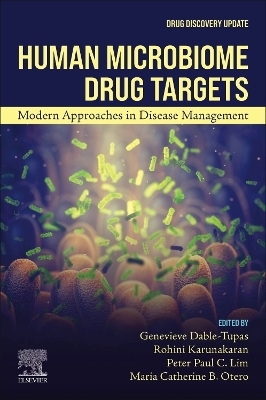
Human Microbiome Drug Targets
Elsevier - Health Sciences Division (Verlag)
978-0-443-15435-5 (ISBN)
Genevieve Dable Tupas, MD, MMCE, FPPS, FPSECP is an Associate Professor at the Research Center, College of Medicine, Davao Medical School Foundation, Inc, Davao City, Philippines. Her research interests include natural products research, clinical epidemiology, and their translation to benefit the community. Dr. Rohini Karunakaran, PhD is an Associate Professor in the Faculty of Medicine, Asian Institute of Medicine, Science and Technology (AIMST University), Malaysia. She is also the Preclinical Coordinator, Medical Education Unit Coordinator and Internal Auditor at AIMST University with administrative responsibilities besides teaching. She holds a PhD in Biochemistry with a Master’s degree in Clinical Microbiology, Bachelor’s in Education and Post Graduate Diplomas in Forensic Science, Human Rights, Medical Laboratory Technology and Bioinformatics. Dr. Rohini has been involved in teaching Biochemistry at both undergraduate and postgraduate levels to MBBS, Dental, and Pharmacy students. She is also involved in guiding and supervising postgraduate students - MSc Medical Biochemistry, PhD Biotechnology and Postgraduate diploma in Bioinformatics students. Dr. Rohini is QMS & IA Certified ISO Internal Auditor for ISO 15189:2012 and ISO 9001:2008. She has published 40 full papers, 39 abstracts in conference proceedings, 6 books and 10 chapters. Dr. Rohini is an editorial board member of reputable national and international journals and has reviewed many articles. She has presented oral papers and posters at international conferences in Malaysia, India, Singapore, Thailand, Hongkong and Srilanka, and has served as speaker at international conferences. Dr. Rohini has been awarded the Young Scientist Award (2013), “Young Biotechnologist Award (2015), “Gold Medal and “A grade for Research Methodology (2015). She has also won the “Young Scientist Award (2016), “Young Scientist Award (2017) and the YSP fellowship programme at Seoul, Korea (2018). Also, she is a recipient of the Prestigious IRDP Award (2018), Outstanding Researcher in Biochemistry (2018), Dr. APJ Abdul Kalam Award for Young Scientists (2018) and Best Outstanding Academician International Award 2020 - Kamarajar Institute of Education and Research. Dr. Rohini has been awarded the status of Associate Fellow of AMEE (Association for Medical Education in Europe). Peter Paul Lim is a pediatrician and a fellow of the American Academy of Pediatrics. He finished his residency in Pediatrics at the Janet Weis Children’s Hospital-Geisinger Medical Center in Danville, Pennsylvania. Following completion of his residency he briefly practiced general pediatrics in South Dakota where he was Assistant Clinical Professor of Pediatrics at the University of South Dakota School of Medicine. He is currently doing a fellowship training in Pediatric Infectious Diseases at the Rainbow Babies and Children’s Hospital-University Hospitals/Case Western Reserve University in Cleveland, Ohio. Dr. Lim has written multiple publications and has served as a reviewer for several journals. His main research of interest is on antimicrobial and diagnostic stewardship. He is currently involved in developing antibiotic stewardship guidelines and quality improvement research projects that promote responsible use of antibiotics and diagnostics. He is an active member of the Infectious Disease Society of America and the Pediatric Infectious Disease Society. Maria Catherine B. Otero is currently doing her PhD in Health Science (by Research) in the College of Medicine of the University of the Philippines Manila specializing on wastewater surveillance of COVID-19 and Antimicrobial Resistance. She obtained her MS in Public Health (Medical Microbiology) from the College of Public Health, also in UP Manila, and she worked on the detection of Chikungunya virus in Philippine macaques from the Davao Region in collaboration with the Research Institute for Tropical Medicine. Ms. Otero is also a Biomedical Consultant of the College of Medicine Research Center and BS Biology faculty of the Davao Medical School
Part One: Foundational Information 1. Tracing the History of Microbiome Evolution 2. The Human Microbiome: An Overview 3. The GUT Microbiome 4. The Microbiome and One Health Approach 5. Overview of Human Microbiome and Drug Discovery Part Two: Human Microbiome in Health and Disease 6. Human Microbiome and Nutrition 7. Human Microbiome and Mental Health 8. Human Microbiome and Diabetes 9. Human Microbiome and Cancer and Cancer Therapy 10. Human Microbiome, Obesity and Cardiovascular Diseases 11. Human Microbiome and Respiratory Diseases 12. Human Microbiome and Liver Diseases 13. Human Microbiome and Neuro-Developmental Disorders 14. Human Microbiome and Inflammatory Diseases Part Three: Microbiome and Drug Discovery 15. The Human Microbiome as Drug Targets 16. Microbiome-Based Therapeutics (Including Probiotics, Prebiotics and Symbiotics) 17. Microbiome Metabolite Based Therapies 18. Role of Nanotechnology in Microbiome Drug Development 19. Microbiome-Based Therapies on Trial
| Erscheinungsdatum | 29.10.2024 |
|---|---|
| Verlagsort | Philadelphia |
| Sprache | englisch |
| Maße | 216 x 276 mm |
| Gewicht | 450 g |
| Themenwelt | Medizin / Pharmazie ► Medizinische Fachgebiete ► Pharmakologie / Pharmakotherapie |
| Naturwissenschaften ► Chemie ► Organische Chemie | |
| ISBN-10 | 0-443-15435-X / 044315435X |
| ISBN-13 | 978-0-443-15435-5 / 9780443154355 |
| Zustand | Neuware |
| Informationen gemäß Produktsicherheitsverordnung (GPSR) | |
| Haben Sie eine Frage zum Produkt? |
aus dem Bereich


